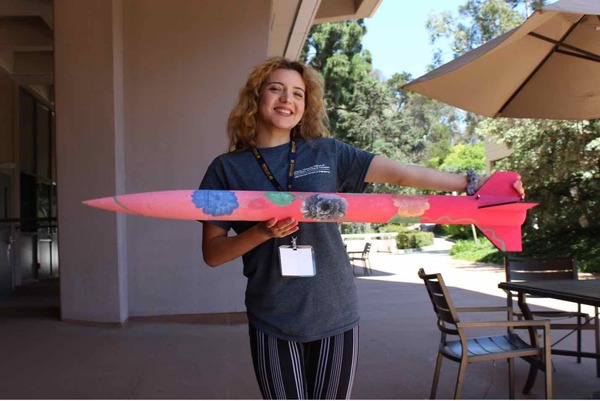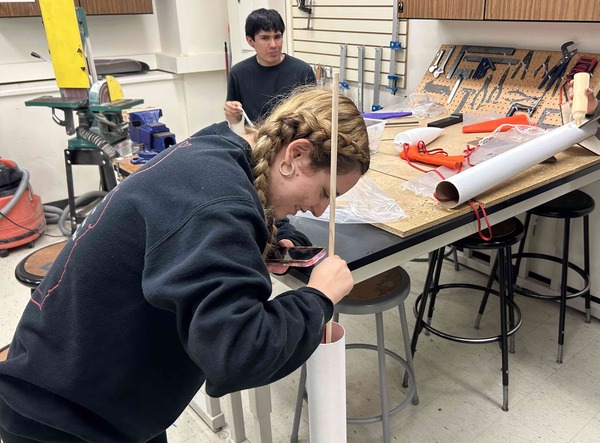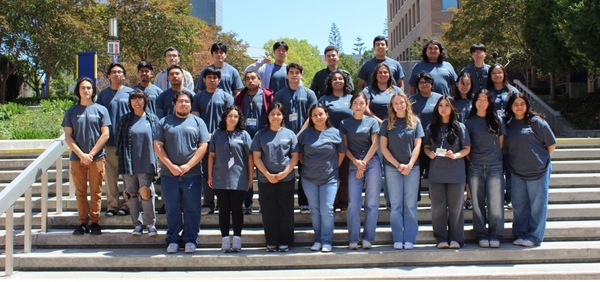Students Build Personal Rockets in UCI Rocketry Camp

August 21, 2025 - In less than a month, 30 students will send their creations half a mile away—directly upwards. If all goes to plan, they’ll watch them float back down.
Last week, 30 community college students gathered to take part in the inaugural UCI Rocketry Program, a weeklong summer course dedicated to the engineering behind one of humanity’s landmark inventions. Students built, personalized, and will eventually launch their own rockets. While other summer camps might end in a competition, these students will walk away with national certification.
The National Association of Rocketry (NAR) grants permits for non-professionals to purchase rocket motors above a certain power, split into three separate levels. The first level requires applicants to construct a rocket themselves, and using a high-powered motor, safely launch and recover their craft.
These students’ rockets are designed to do just that. Standing at just over three feet tall, their rockets are powered by H-class motors, which sit in the first tier of high-power motors designated by NAR and require a Level 1 certification to acquire. These solid fuel motors are expected to propel their rockets approximately 2,600 feet into air before a secondary charge releases the recovery system and returns the chassis safely back to Earth. The students are excited to witness the launch which is set for September 13 at the Rocketry Organization of California’s site in Lucerne Valley.

“I’m hopeful for my rocket to work,” said Jose Mora, a student at Fullerton College looking at a future in manufacturing engineering after returning to college, following his time in industry. “I see no reason it shouldn’t.”
The program doesn’t just lead the students to a Level 1 NAR certification; it gives them the information and experience necessary to complete the second level. Since Level 2 requires a launch with a J-class motor, which is four times more powerful than the H-class, the students’ rockets are built to withstand even higher forces.
The students come from varied engineering backgrounds. While some are looking towards aerospace engineering, others are in mechanical, civil, and electrical engineering programs, as well as computer science and astrophysics. Many, like Corona, discovered this opportunity through their college’s MESA (Mathematics, Engineering, Science Achievement) program.
Although these students will likely obtain national certification, that wasn’t what drew many of them in. For many students, like Sarahsaday Sandoval who is in her third year at Cerritos College, transferring into UCI is the end goal. “I wanted to participate in this camp for the experience and new skills I could learn,” she said. “I was excited, as well, to know more about my dream school, UCI.”
Throughout the week, students got a glimpse of the groups and projects on campus, including tours of engineering labs, faculty presentations, and UCI’s rocketry program. The impressive UCI Rocket Project teams were instant favorites for many of the students. The UCI Rocket Project Solids team recently came in first place in their category at the 2025 International Rocket Engineering Competition while the UCI Rocket Project Liquids team launched a cutting-edge methalox rocket in 2023.
They were inspired to see the real-world rocket engineering and launches students their age have achieved. Several students’ end-of-course presentations not only expressed their surprise at the scope of UCI’s projects, but also a newfound drive after learning about the programs like the Transfer Admission Guarantee, or TAG, that is available to them all.

The rocketry summer course was offered by the Stacey Nicholas Office of Outreach, Access & Inclusion at the UCI Samueli School of Engineering. “Participants were selected from a talented group of applicants to receive a scholarship to attend this exciting program, made possible by the generous support of the Broadcom Foundation," said Leyla Riley, Director of Outreach. "We are deeply grateful for their continued commitment to STEM education and inspiring the next generation of innovators.”
There was, however, one additional wish from the students. Several brought it up throughout the week and in their presentations. Jasses Sanchez, a second year student at Cerritos College, puts it clearest: “I wish the camp was longer.”
- Leo Garcia
